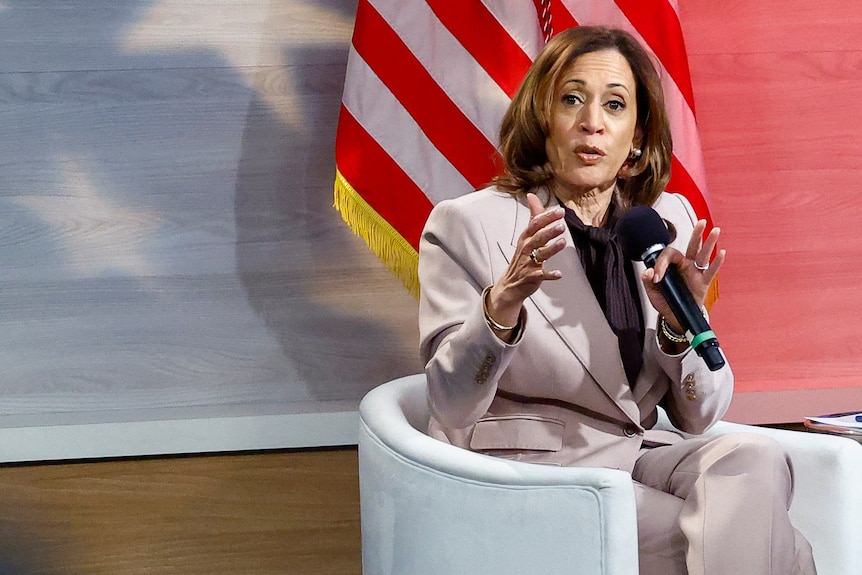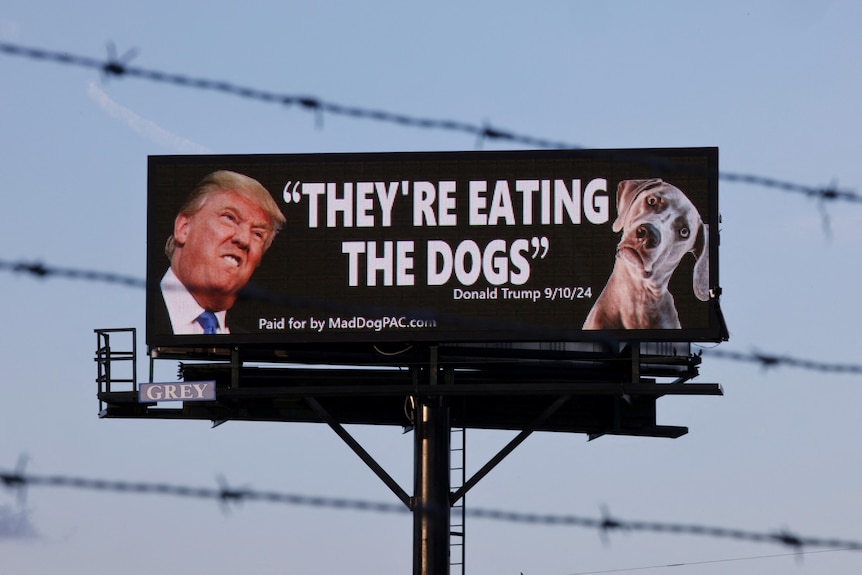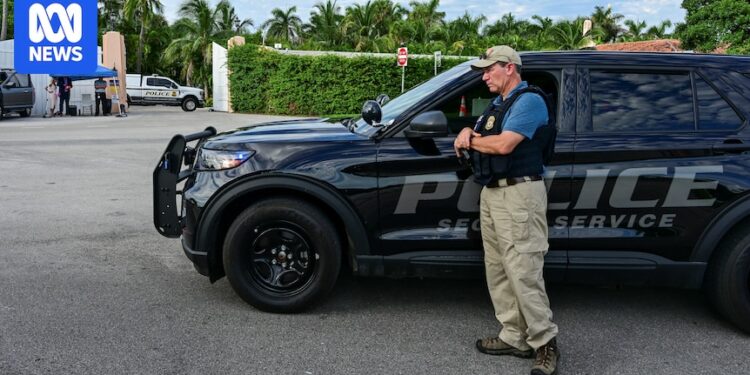Welcome back to your weekly update on US politics, where North America bureau chief Jade Macmillan catches you up on the biggest developments in America as we hurtle towards election day in November.
With a one-line statement issued this week, the FBI confirmed fears about the potential for further violence in an already volatile election cycle.Â
“The FBI has responded to West Palm Beach, Florida,” the statement read, “and is investigating what appears to be an attempted assassination of former president Donald Trump.”
A Secret Service agent, according to authorities, had spotted the barrel of a rifle poking through the tree line of the golf course where the former president was playing on Sunday afternoon, local time.Â
The agent opened fire, but the suspect escaped, before being arrested nearby.
Donald Trump has blamed his political opponents’ rhetoric for the attempts on his life. (Reuters: Brendan McDermid)
Neither Trump, nor anyone he was with, were harmed. And there’s a lot we still don’t know about the 58-year-old who’s now in custody, charged with gun offences.Â
But the awful sense of deja vu over what was quickly assessed as a second apparent attempt in two months to take the former president’s life doesn’t just prompt concerns about the level of protection he’s being provided with.Â
It also raises troubling questions about the ongoing threat posed by political violence in the United States.Â
A blame game
Trump avoided casting political blame in the immediate aftermath of the first assassination attempt, in Pennsylvania, briefly arguing that he wanted to use the moment to work towards national unity.Â
But he didn’t hold back this time, telling Fox News the suspect “believed the rhetoric of Biden and Harris, and he acted on it”.
The security question at the heart of Trump’s golf course incident
“Their rhetoric is causing me to be shot at, when I am the one who is going to save the country, and they are the ones that are destroying the country — both from the inside and out,” he said.
Trump had last week argued in his debate with Vice-President Kamala Harris that he “probably took a bullet to the head because of the things that they say about me”.
“They talk about democracy, ‘I’m a threat to democracy’. They’re the threat to democracy,” he said.
Democrats have repeatedly argued a second Trump term would threaten US democracy, pointing to his handling of the January 6 Capitol attack and to comments such as his statement that he wouldn’t be a dictator, “other than day one”.
Both President Joe Biden and Harris expressed relief that the former president wasn’t injured in the latest incident, and they each spoke to him on the phone in the days afterwards.Â
But the vice-president later criticised Trump over his own rhetoric, accusing him of “spewing lies” in relation to unfounded claims that migrants are eating pets in Springfield, Ohio.
“We’ve got to say that you cannot be entrusted with standing behind the seal of the president of the United States of America engaging in that hateful rhetoric that, as usual, is designed to divide us as a country,” she told an event hosted by the National Association of Black Journalists (NABJ).

Kamala Harris said too many Americans were feeling unsafe. (Reuters: Piroschka van de Wouw)
Authorities in Springfield have reported more than 30 bomb threat hoaxes since rumours, amplified by Trump on the debate stage, took hold, prompting police officers to be deployed to local schools.Â
Ohio Governor Mike DeWine said many of the threats had come from an unnamed foreign country, and were being treated as “one more opportunity to mess with the United States.”
But Harris again referenced the situation in Springfield in that same NABJ event when she argued there were “far too many people in our country right now who are not feeling safe”.
“Not everybody has Secret Service,” she said.
Trump, however, says he’s planning a visit to Springfield in the next two weeks, telling supporters in New York, “You may never see me again, but that’s OK.”
“‘Whatever happened to Trump?’ ‘Well, he never got out of Springfield,'” he said.

Donald Trump has been mocked in political ads such as this one on a billboard in North Carolina. (Reuters: Jonathan Drake)
Calls for calm as campaigning continues
Both Biden and Harris have again argued this week that there’s “no place” for political violence in the US.
But FBI director Christopher Wray told Congress, in the wake of the first attempt on Trump’s life in July, that it was “out of control”.
Past weeks in US politics:
“We get thousands and thousands and thousands and thousands and thousands of tips reported to us and the language that’s out there is just mind-bogglingly hateful,” he said at the time.
Only this week, an Alaska man was charged with threatening to assassinate Supreme Court justices, and suspicious packages were mailed to election officials in more than 15 states.
And earlier this year, a man was sentenced to 30 years in prison for attempting to kidnap former Democratic House speaker Nancy Pelosi, and for attacking her husband with a hammer.
The attack at Trump’s rally in Butler, Pennsylvania, led to intense scrutiny of the Secret Service, and a stepping up of protection.
The suspected second attempt has sparked a new debate over how the agency is funded.Â
But with less than two months to go until election day, both candidates are ploughing ahead with their campaigns – as Americans nervously hope there won’t be any further scares.
One to watch: A weekend trip to Delaware
As the end of Biden’s first and only term in the White House approaches, the president appears to be in the mood for reflection.Â
So much so that he’s invited the Australian prime minister, among others, to his personal residence and his old high school.Â
The president will host the leaders of the Quad grouping, made up of the US, Australia, Japan and India, in Delaware this weekend.
Albanese heads to the US for Quad talks
The White House argues “foreign policy is personal”, and that Biden is seeking to build on the relationships he’s developed with each leader over his time in office.
But Washington’s press corps has complained that the media is being kept out of his Wilmington home, where one-on-one meetings will take place outside of the main Quad gathering.Â
“I can’t remember a time where this president has had a bilateral meeting on US soil and the press and therefore the American people were blocked from seeing it,” White House Correspondents’ Association president Eugene Daniels said in a statement.
Amid political pressure at home, Anthony Albanese has stressed the speedy nature of his visit to the US.
But in what could be his last official in-person meeting with Biden, it’s likely to be a memorable trip.Â
Loading
Source link : http://www.bing.com/news/apiclick.aspx?ref=FexRss&aid=&tid=66ecb29b72af489fad30a3e8cc461b73&url=https%3A%2F%2Fwww.abc.net.au%2Fnews%2F2024-09-20%2Felection-race-dark-turn-week-in-us-politics-macmillan%2F104374418&c=11294348275647532237&mkt=en-us
Author :
Publish date : 2024-09-18 13:00:00
Copyright for syndicated content belongs to the linked Source.












